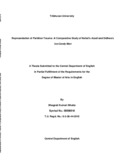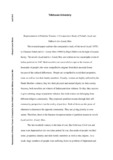Please use this identifier to cite or link to this item:
https://elibrary.tucl.edu.np/handle/123456789/3173Full metadata record
| DC Field | Value | Language |
|---|---|---|
| dc.contributor.author | Bhatt, Bhagarati Kumar | |
| dc.date.accessioned | 2021-04-07T10:51:22Z | |
| dc.date.accessioned | 2021-07-23T04:27:50Z | - |
| dc.date.available | 2021-04-07T10:51:22Z | |
| dc.date.available | 2021-07-23T04:27:50Z | - |
| dc.date.issued | 2019 | |
| dc.identifier.uri | http://elibrary.tucl.edu.np/handle/123456789/3173 | - |
| dc.description.abstract | The split between India and Pakistan served to heighten each other's hostilities instead of bringing peace in the both independent countries. Millions of people were affected by such hostilities. During that violence, there is the scene of home burnt down, villages abandoned, child abducted, women were embarrassed of the sexual humiliation and they compelled to suicide because their family refuse to accept them. The destruction of family through murder, suicide and kidnapping are the main cause of grievous trauma of partition which Chaman Nahal and Bapsi Sidhwa very clearly focus in their novel Azadi and Ice Candy Man. But the problem is there; both writers use the prose of otherness to demonize the opposite community. Nahal projects that Muslims are responsible for the eruption of the partition violence. In his novel, he presents the tragic story of Hindus and Sikhs refugee who are originally belonging from Sialkot, Pakistan but forcefully avoid their ancestral home. Nahal's novel shows Hindus and Sikhs are suffering from Partition. Similarly, Sidhwa presents the tragic story of Hindu sand Muslims people in Lahore. She clearly mentions that during partition Muslims and Pakistan have suffered. Therefore, these types of representation of their work show the possibility of identity politics of author in their novel Azadi and Ice-Candy Man. Key Words: Cultural Trauma, Partition, violence, prose of otherness | en_US |
| dc.language.iso | en_US | en_US |
| dc.publisher | Central Department of English | en_US |
| dc.subject | prose of otherness | en_US |
| dc.subject | Cultural Trauma | en_US |
| dc.subject | Partition | en_US |
| dc.subject | violence | en_US |
| dc.title | Representation of Partition Trauma: A Comparative Study of Nahal's Azadi and Sidhwa's Ice-Candy Man | en_US |
| dc.type | Thesis | en_US |
| Appears in Collections: | English | |
Files in This Item:
| File | Description | Size | Format | |
|---|---|---|---|---|
| Cover Page(3).pdf | 18.88 kB | Adobe PDF |  View/Open | |
| Chapter Page(1).pdf | 95.29 kB | Adobe PDF |  View/Open |
Items in DSpace are protected by copyright, with all rights reserved, unless otherwise indicated.
